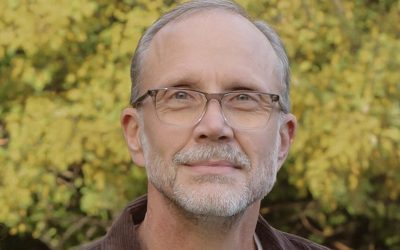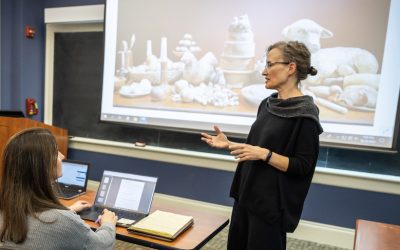Goodwin served as Drew University’s Thomas H. Kean Visiting Professor for the spring semester
March 2024 – Pulitzer Prize-winning historian Doris Kearns Goodwin wrapped up her time as Drew University’s Thomas H. Kean Visiting Professor in a virtual Drew Forum event.
Goodwin has made a number of trips to Drew during the spring 2024 semester, teaching classes focused on leadership in turbulent times, offering lessons from the past that can provide insights on leadership in any field.
Enlarge

“I had an extraordinary time,” said Goodwin of her class visits. “The students love the professors, they were engaged, and they asked great questions. I’m really, really grateful that I came. Drew is a wonderful school and a wonderful place.”
In addition to her time in the Drew classroom, Goodwin spoke at a sold-out Drew Forum event in the Concert Hall in February.
The virtual event, moderated by Jeremy Blatter, associate professor of media and communications, covered why Goodwin became an historian, the value of learning history, historical comparisons to current times, and her forthcoming book An Unfinished Love Story: A Personal History of the 1960s. Copies of the book will be available at the Drew University Bookstore upon its release in April.
A few takeaways from the virtual event:
Having studied presidents, what characteristics make a great leader?
Humility. Empathy. Resilience. Accessibility. Ambition.
“I think it starts with humility. It means you’ve got the confidence to admit you’ve made a mistake or don’t know something you need to know, and that’s the only way to grow…..Empathy, the ability to feel what other people are feeling, to understand and listen to them in a big, sprawling democracy like ours….Maybe everybody starts out with an ambition for self. But with the great leaders, eventually that ambition becomes something larger, it’s for the greater good, and you’re willing to put principle over politics if you want to make a difference in someone’s lives.”
Enlarge

How did presidents relax?
While Teddy Roosevelt’s robust physical activity is widely known, less remembered are the methods employed by Abraham Lincoln and Franklin Roosevelt. Pulling from her biographies on both presidents, Goodwin recalled stories of Lincoln turning to humor in times of stress—”to whistle off sadness, a funny story for him was better than a drop of whiskey.” FDR hosted nightly cocktail parties with one rule: no talking about the war.
Is the value of learning from history too tied to “those who don’t learn from history are doomed to repeat it”?
“What it suggests is that there are patterns in history and if we can learn from them, maybe not make the mistakes that we did,” said Goodwin. “Just like we learn from our parents and grandparents, we can learn from the people who lived before us, from their triumphs and their troubles. Learning from history makes you empathetic to the people who lived at that time. It makes you feel like there are layers in your past that are part of your present. For young people to have that broader understanding of what worked at certain times, what people felt, and how human nature is at the core of history. Studying history means you’re studying human nature, you’re studying conflict, troubles, as well as wonderful times when people come together.
On the role of historians in the discourse of current affairs
Goodwin noted the Bill Clinton-Monica Lewinsky scandal and subsequent impeachment trial as a turning point in historians being called on to put current events in historical context.
“What I try to do is bring the past to bear so you have some historical echoes and people can feel ‘this is something that may sound familiar.’”
The Thomas H. Kean Visiting Professorship brings an individual of exceptional national or international distinction in their field to serve as a member of Drew’s academic community and lead public programs for Drew’s local and worldwide constituencies.


